
Archaeology News in Suffolk
A collection of archaeological news, projects and events in Suffolk from Suffolk County Council Archaeological Service
Welcome to our e-newsletter for October 2022
New volunteering opportunities available:
Post-Excavation Processing, as part of the Rendlesham Revealed project
Geophysical Survey, Fieldwaking and Finds Processing at Lackford Lakes, as part of the Brecks, Fen Edge and Rivers project.
Keep reading to find out more.
Featured Projects - Rendlesham Revealed
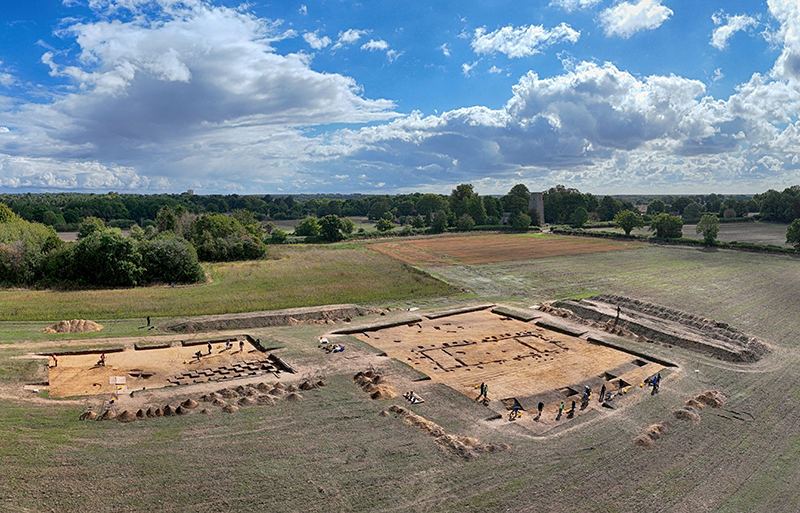
Image: Drone photograph of the excavations at Rendlesham, showing the excavated hall and boundary ditch (right hand trench) and associated rubbish dump (left hand trench). (© Suffolk County Council; photo by Jim Pullen)
Royal Hall of the East Anglian Kings found in Suffolk
The second season of Rendlesham Revealed excavations are now complete and have unearthed some exciting discoveries.
Evidence of a 1,400 year-old royal Hall of the first Kings of East Anglia was unearthed, which confirms that this site is the royal residence as recorded in the writings of the Venerable Bede of the 8th century.
The excavations took place over two trenches, revealing the foundations of the large hall, the perimeter ditch enclosing the royal compound, and remains of food preparation and feasting. Traces of earlier settlement and activity were also uncovered.
Over 250 volunteers from the local community were involved, including young adults from Suffolk Family Carers, Suffolk Mind and local school children. The excavations were led by Suffolk County Council Archaeological Service, supported by Cotswold Archaeology and funded by the National Lottery Heritage Fund.
Please note the trenches are backfilled and the site is on private land with no public access.
This season’s fieldwork at Rendlesham is now over and the excavations have been backfilled. Work has begun on analysis of the finds with provisional results expected in Summer 2023. The next season of archaeological fieldwork will take place in Summer 2023 and local people will again be able to volunteer. This will be advertised in the Archaeology News in Suffolk e-newsletter in July 2023
Find out more about the excavations and other fieldwork taking place as part of the Rendlesham Revealed project on our new "Rendlesham Community Fieldwork" section on our website
Upcoming Volunteering Opportunities
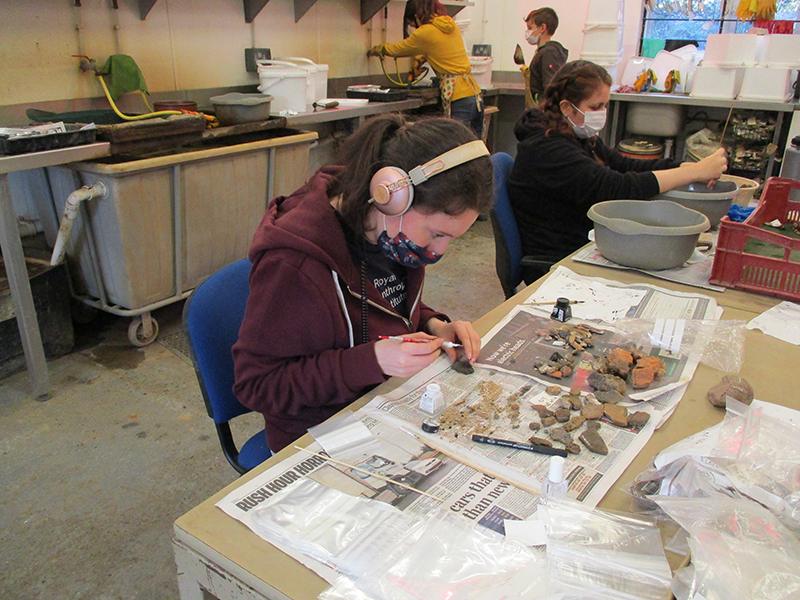
Image: Volunteers processing finds (foreground) and soil samples (background) (© Suffolk County Council; taken by Cotswold Archaelogy)
Rendlesham Revealed: Anglo-Saxon Life in South-East Suffolk
Volunteering Opportunities for Post-Excavation Processing
(Free, booking essential)
Volunteers are invited to take part in the Post-Excavation Processing work on the excavated material from the summer's fieldwork at Rendlesham. Volunteer days are Mondays and Fridays 9.30am-3pm (Booking is Essential). The sessions are hosted by Cotswold Archaeology at their post-excavation warehouse on the Lion Barn Industrial Estate in Needham Market.
Volunteers will have the opportunities to wash and mark finds from the excavation and under the guidance of Cotswold post-excavation staff learn how to quantify the finds and prepare them to be sent to specialists for assessment. Volunteers may also process and sort the environmental bulk samples, input site data onto a database and photograph and record the registered artefacts.
No experience necessary as training and support will be provided by Cotswold Archaeology. Suitable for ages 12+, under 18 must be accompanied by an adult - both child and adult must book a space.
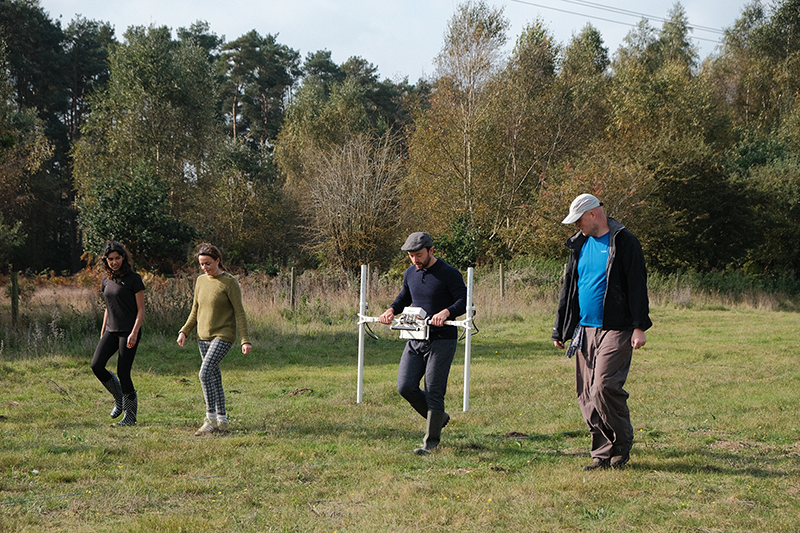
Image: Volunteers conducting a geophysical survey at West Stow in 2021 (© Suffolk County Council)
Brecks, Fen Edge and Rivers Landscape Partnership
Volunteering Opportunities for Geophysical Survey, Fieldwaking and Finds Processing at Lackford Lakes
(£5pp per session, booking essential)
We are excited to announce several volunteering opportunities in archaeological fieldwork, including geophysical survey, fieldwalking and finds processing at Lackford Lakes this October, as part of the Brecks, Fen Edge and Rivers project.
This is a fantastic opportunity to get involved in some hands-on history, exploring what lies hidden beneath our feet. You do not need to have any previous experience, just an interest in archaeology and history.
All the below volunteering will take place at Suffolk Wildlife Trust, Lackford Lakes, Bury St Edmunds, IP28 6HX.
Click on the links below to book your space.
Geophysical Survey Training Workshops
11th-14th October 2022 (4-day workshop), 10am-3pm each day, £5pp
18th-21st October 2022 (4-day workshop), 10am-3pm each day, £5pp
These two 4-day workshops are the same and are a repeat of last year's training. Suitable for ages 18+ years. Volunteers will be required to attend all four days of the training.
The training will be provided by professional archaeologists from Phase SI Investigations. You will learn about the different types of geophysical survey techniques, be trained how to use a magnetometer and learn how archaeologists interpret the results. Note: this is an outdoor activity requiring you to be physically fit for walking over uneven ground and being on your feet throughout the day.
Fieldwalking Survey Sessions
25th October 2022 (1-day workshop), 10am-4pm, £5pp
26th October 2022 (1-day workshop), 10am-4pm, £5pp
Suitable for ages 12+, under 18 must be accompanied by a paying adult.
The training will be provided by professional archaeologists from Cotswold Archaeology. You will learn how to fieldwalk systematically to recover artefacts on the surface of a field. Note: this is an outdoor activity requiring you to be physically fit for walking over uneven ground and being on your feet throughout the day.
Finds Processing Session
27th October 2022 (1-day workshop), 10am-4pm, £5pp
Suitable for ages 12+, under 18 must be accompanied by a paying adult. This session compliments the Fieldwalking Survey sessions.
The training will be provided by professional archaeologists from Cotswold Archaeology. Finds processing is an important skill for archaeologists to understand more about the objects recovered by fieldwork. You will learn how to process the finds, including washing and sorting objects. Note: this is an indoor activity.
Finds Recording in Suffolk
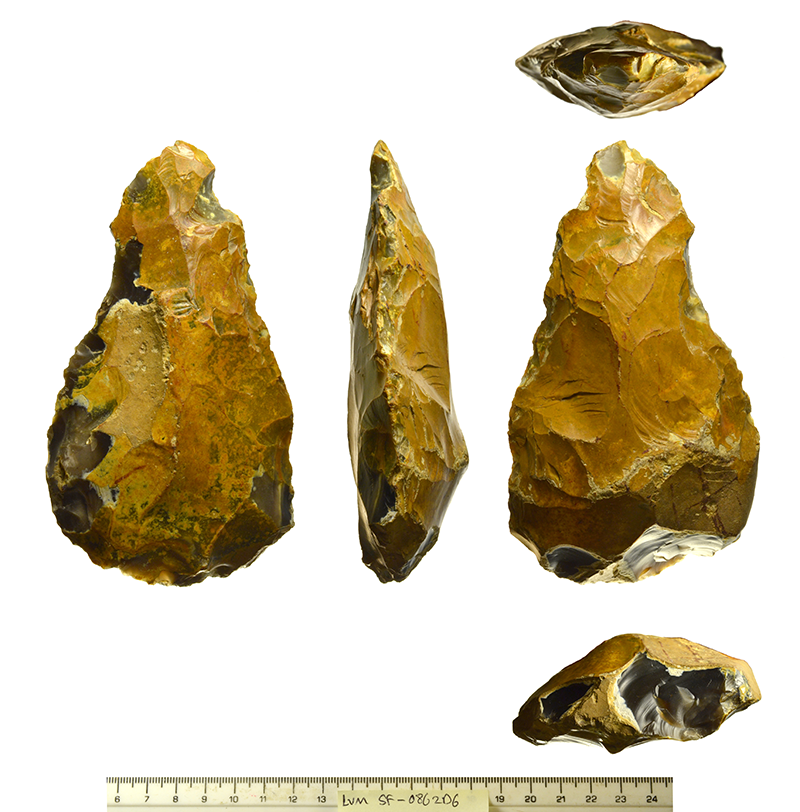
Image: Lower Palaeolithic handaxe (© Suffolk County Council)
Featured Find - Lower Palaeolithic handaxe, Lavenham
Recovered by chance by a local metal detector user in 2016 near Lavenham, this Palaeolithic handaxe represents one of the earliest types of artefacts found in Suffolk. Made from flint, the handaxe is ‘bifacially worked’, meaning it has been shaped on both sides producing sharp edges.
If you have recently found an archaeological object in Suffolk which you'd like identified and recorded, our Finds Recording Team can help. Find out more about Finds Recording here.
Archaeology in Development
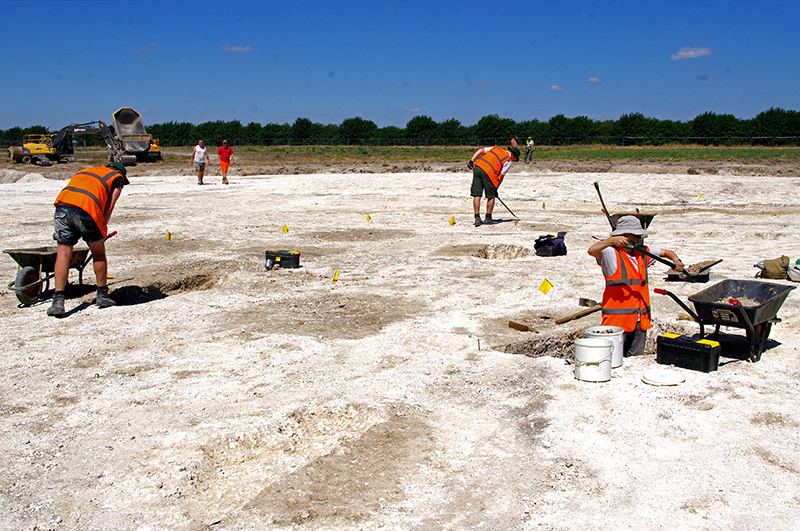
Image: Archaeologists at work, excavating Iron Age pits at the Mildenhall Hub site. (© Cotswold Archaeology)
Iron Age and Anglo-Saxon settlement, Mildenhall Hub
From 2016 to 2018, a series of archaeological excavations took place ahead of the development of the Mildenhall Hub, now at Recreation Way. An Iron Age settlement was revealed by a series of pits, clustered in a dozen groups, which were associated with field boundaries. The pits contained occupation evidence such as pottery, butchered animal bone and burnt stone.
The remains of buildings and a burial of the Early Anglo-Saxon period were also unearthed, with evidence of small timber halls and sunken-featured buildings dating to the 5th-6th century. The burial was later in date c. AD 650 and was the only grave found.
Following the completion of the excavation, the finds and remains have undergone specialist analysis and a full report on the results of the project is nearing completion (and will be made publicly available in due course). Suffolk County Council’s Archaeology Service oversaw the excavation, which was commissioned by Concertus and carried out by Cotswold Archaeology (Suffolk).
Thank you for joining our e-newsletter, for those who are new, here's a brief summary of what we do.
We are the main provider of archaeological advice in Suffolk and to promote the conservation, enhancement and understanding of Suffolk's distinctive historic environment, we:
- maintain a record of archaeology and heritage assets, the Historic Environment Record
- provide advice to planners, developers and farmers
- identify and record finds made by members of the public
- curate an archive for fieldwork projects carried out in the county
- publish the results of fieldwork and other research into Suffolk's past